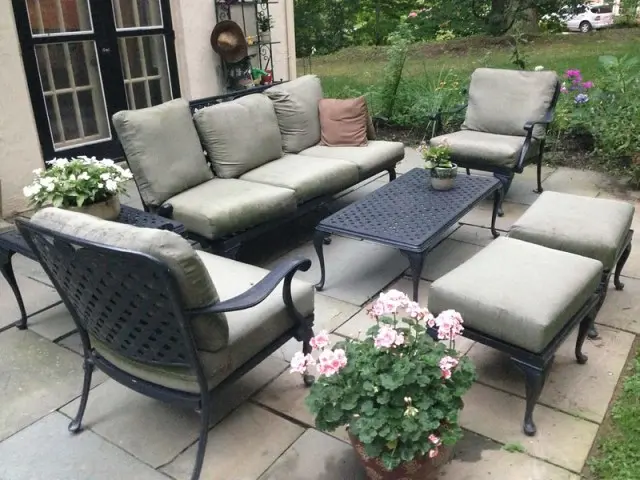Last Updated on 1 year by Namrata
Furniture on your outside lawn or terrace may look classy, but in no time, it becomes a lounging spot for insects like spiders. These spiders can affect your serene outdoor experience by getting in your body and clothes, which is concerning. Why? It is because many crawling spiders are poisonous and can land you in the hospital.
If you are already tired of these crawlies dwelling in the nook and corner of your outdoor furniture, then it’s time to get rid of them. You do not have to use any harmful insecticide but only some organic way-outs like the one below.
Reasons to Keep Spiders Away from Outdoor Furniture
Even though most spiders and other insects are common in outdoor occurrences, they can be a nuisance.
● Many spiders are poisonous, and their bite can put you in the hospital.
● Not safe for children to play or sit on this spider-nested furniture.
● Unwelcoming for guests.
● May attract other insects and crawling pests to dwell in.
● Not safe and runs the risk of allergic reactions or infections.

13 Ways to Prevent Spider Nesting on Outdoor Furniture
- Don’t Miss Regular Furniture Cleaning
One of the simple and logical ways to prevent insects from your furniture is by regular dusting and cleaning. Only simple dusting and wiping the surface with a clean, damp cloth regularly can make your furniture well-maintained and keep the insects away. However, make sure that you use a damp cloth on waterproof furniture only. Otherwise, dust off and entirely dry out your furniture to prevent rusting and discoloration.
- Cover Your Furniture
Now that it’s obvious that you can’t deep clean or wet your outside furniture, it’s better to cover them. Not only spiders but wrapping your furniture with a cloak improves its durability and longevity and keeps them safe from harsh weather conditions. These covers protect the furniture from insects and small animals. To be on the safer side, try to cross-check for hidden insects or spiders before covering or uncovering them. It is so because some spiders may crawl down to hidden places.
- Install the Furniture in a Shady Place
Most outdoor furniture is built with hardcore materials and is, therefore, more durable than other types. Still, it can incur sun damage if kept out for a longer time. So, it’s better to place the furniture in the shade. Also, make sure that the furniture is dry and free from moisture, as it can grow mold. That moldy furniture will attract spiders and other pests to gather there.
- Don’t Neglect the Egg Sacs
Like others, if you also neglect the baby spiders or overlook the egg sacs, then it will be troublesome for you in the long run. You should prevent the baby spiders by vacuuming or destroying the eggs. It’s easy to identify those egg sacs because they are cone or ball-shaped silk pieces in white or tan textures. These egg sacs are usually located near their webs or concealed in dark room areas that you don’t pay attention to. So, you can prevent them by simply crushing them or destroying the spider lings inside.
- Clean Outdoor Patio
As you may already know, these crawling insects reside in areas that are dark and undisturbed, such as near piles of wood logs, rocks, or construction materials. So, rearrange and clutter off your patio. In this way, you may avoid spiders from crawling around the items. Remember to take precautions while decluttering and moving these patios. For that, wear long sleeves and hand gloves while rearranging things in case there are spiders already inside.
- Seal the Gaps and Cracks If Any
The act of sealing these cracks and gaps in your home is known as caulking. So, caulking prevents spiders from getting inside or hiding in the furniture. For that, you should start by locating the foundation of your home or near the patios to find the holes and cracks. To seal those gaps, have a caulk gun and start applying the caulk slowly. Wait until the caulk gets tight and thoroughly sealed so that the spiders can’t get through the gaps.
- Prevent Insects that Spiders Mostly Prey
Spiders won’t get to feed if there are no other insects that they prey upon. So, controlling those insects is the first step. To have an idea about those likely insects, keep on checking the webs near the patios to find which kinds of insects are mostly caught in them. Take your measures accordingly. Like, if you find moths and gnats as the main prey, then turn off the outdoor lights as that could attract pests and bugs. Otherwise, you can also make natural traps for mosquitoes and flies.
- Place Hedge Apples
Among other popular choices, many households also set out hedge apples to repel bugs and spiders from dwelling inside the furniture. Based on popular beliefs, many say that chemicals inside the fruit turn spiders away. These Hedge apples are also known as Osage apples which are easily available in the local market. Buy some extras to replace them timely. However, even though people share the success stories of using hedge apples, there still needs to be scientific evidence. So, apply the trick when the other above ways don’t work for you.
- Switch off the Outdoor Lights
In most cases, when the outdoor lights are turned on during the dark, it attracts more bugs. Spiders would mainly reside in your garden to hunt other insects. So, it’s obvious that the spider webs will be built nearby, too. It’s better, therefore, to only turn on the outdoor light when you need to or otherwise switch to a purple or yellow bulb. Most bugs are not attracted to purple or yellow lights, which means there won’t be any spiders nearby. If you are someone who forgets to turn off the outdoor lights, then install a motion sensor so the lights are not turned on the entire time.
- Sprinkle Diatomaceous Earth Around the Lawn
Diatomaceous Earth (DE) is a powdery substance easily accessible from the local stationary stores. It’s a useful resource, particularly for inaccessible or problematic areas. For example, in any dark nook and corner or crack where you can clean otherwise, spread the powder uniformly. It is a powerful substance that will cut through the spider’s exoskeleton to kill it. In bad weather or rainy days, you may have to reapply the powder if it wipes out completely. As a safety measure, cover your mouth, nose, and skin so that harmful formulas don’t create any reaction to your skin.
- Trim the Grasses and Plants Regularly
Taller grasses or untrimmed bushes or plants may attract spiders to build their webs. So, it’s better to keep the grasses of your garden under control by mowing them if they grow taller than two to three inches. Try to include it in your monthly routine to ensure that after a periodic mow, the grasses grow healthy. In case of trimming the plants will automatically discourage spiders from hiding in them. Particularly, bring in shape the overhanging plants or transplant those plants further away from the patio.
- Using Essential Oils
Spiders are mainly intolerant to strong scents. That is primarily averse to the smell of citrus, cinnamon, basil, mint, peppermint, and rosemary. So, to deter them, you can spray a few drops of essential oils on your outdoor furniture. These essential oils are not toxic and therefore, are completely safe to be used on furniture. Spiders also avoid lemon-scented products. So, you can also buy organic spray from the market and wipe it on the furniture surface. It will deter the pesky spiders as well as create a fresh aroma near the seating area.
- Repellent Sprays
Repellant sprays are not healthy for the ecosystem around you to grow. Spiders are beneficial because they kill other bugs, mosquitoes, and flies to invade your space. So, you don’t have to inorganically get rid of them. Keep it as a last resort, as they could be more effective outdoors. Use the chemical pesticide when there’s a large spider infestation, and you have to kill them. Otherwise, use them sparingly as it is harmful to children and pets likewise.
Final words
Spiders are the most common crawling insects to hide inside outdoor furniture sets. Unless you take proper measures, it will soon grow in numbers and attract other bugs and insects to your gorgeous garden furniture. So, try to control them by following the above way-outs and be one step ahead in maintaining the outdoor decor of your home.
MORE POSTS: 10 DIY Playroom Ideas: Maximizing Fun in Minimal Space



